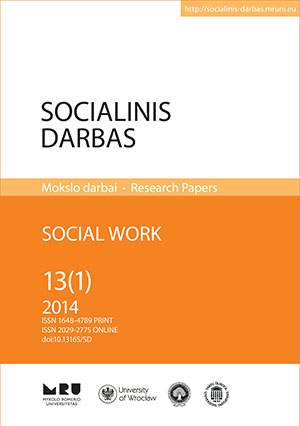Tėvų dalyvavimo ir moksleivių profesinio apsisprendimo saviveiksmingumo sąsajos
The Relationship Between Parental Involvement and Students Career Decision Self-Efficacy
Author(s): Laura Ustinavičiūtė, Emilija PečiulytėSubject(s): Social Sciences
Published by: Mykolas Romeris University
Keywords: career decision self–efficacy; parental involvement; support; interference; lack of engagement
Summary/Abstract: The paper examines the career decision’s self-efficacy of final year students and analyses the relationship between students’ career decision self-efficacy and parental involvement during career decision-making. The importance of cognitive factors in deciding on the profession is sufficiently widely analysed in the modern psychological literature on career topics, but links between external factors, such as parental support, interference, or non-involvement, and career decision’s self-efficacy analysis are inadequate. The aim of this study is to investigate the relationship between parental involvement during career decision-making and students’ career decision self-efficacy. The study sought to find the relationship between three parental involvement facets – support, interference, lack of engagement – and students’ career decision self-efficacy. In order to achieve the aim of this work, the following questions were formulated: whether career decision’s self-efficacy is higher on the profession determined students compared to students not determined on the profession; whether increasing support of parents when deciding on the profession will increase career decision’s self-efficacy of school leavers; whether increasing parental interference and non-involvement while choosing a career in children’s career decision self-efficacy of school leavers will decline; whether perceived parental involvement in choosing a profession is different compared to schoolgirls and schoolboys. 205 students of 11-12 grades from Vilnius and Trakai secondary schools participated in the main research (mean age – 17, SD = 0.8). The assessment was based on two questionnaires: Career-Specific Parental Behaviours (Dietrich, Kracke, 2009) and Career Decision Self-efficacy Short-Form Scale (Betz, Klein, 1996). The results indicated that parental support and interference were positively related to career decision’s self-efficacy, while lack of engagement was negatively associated with career decision’s self-efficacy. As well as this, it was found that students, who have made their final career choice, scored higher on Career Decision Self-efficacy. There were no gender differences between parental support and interference; however, it was found that boys tend to receive less parental involvement in their career decision–making compared to girls.
Journal: Socialinis darbas
- Issue Year: 13/2014
- Issue No: 1
- Page Range: 110-122
- Page Count: 13
- Language: Lithuanian

